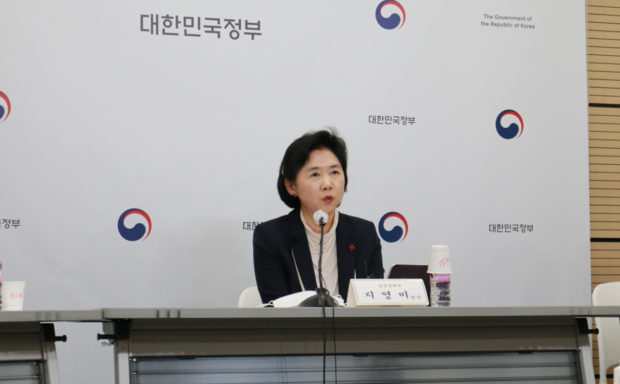
Jee Young-mee, the head of the Korea Disease Control and Prevention Agency, speaks at the press conference held Tuesday. (KDCA via The Korea Herald/Asia News Network)
SEOUL — South Korea will weigh whether to lift the remaining COVID-19 policies based on the World Health Organization decision on the status of the disease, the country’s public health chief said Tuesday.
Korea Disease Control and Prevention Agency’s commissioner Jee Young-mee said in a press conference that while the discussions around the future course of COVID-19 policies have begun within the government, the decision on any change would likely come after the WHO withdraws its official emergency designation.
“At the agency, our experts are preparing for the possibility of further easing masking rules or downgrading COVID-19’s threat status. I think point would come after the WHO declares COVID-19 is no longer a global emergency,” she said.
“Because the outcomes of public health policies are intertwined in a pandemic, we cannot decide to transition out of the emergency as a single country.”
The WHO ruled that COVID-19 still constitutes a public health emergency of international concern on Jan. 30, keeping the highest alert on the disease three years since it was first declared.
Also on Jan. 30, Korea removed the mandatory wearing of face masks at indoor places — one of its last few COVID-19 rules — though the rule was kept in high risk places such as public transport and hospitals. The other main COVID-19 measure still in place is the seven-day isolation requirement for patients since the day of the positive test.
“The return of normal life does not mean the emergency caused by COVID-19 is over, but rather that we are transitioning to a more manageable phase of the pandemic,” she said.
Jee once again stressed wearing face mask continued to be recommended in crowded settings, around vulnerable people and in the event of suspected symptoms.
To do away with what’s left of the rules, COVID-19 would need to be downgraded to the same threat status as seasonal flu.
“For that to be possible, COVID-19 would have to cause a lot fewer cases and deaths,” she said.
She said the travel measures for arrivals from China, which is seeing the worst outbreak since Wuhan, may be relaxed as the situation there improves.
“Although official statistics from China aren’t available, the feared surge following the Lunar New Year holiday isn’t being observed,” she said, adding that the testing before and after arrival here will remain in place at least for some time.
Jee took office as the head of Korea’s top public health agency on Dec. 19.
RELATED STORIES
South Korea’s indoor masking eased, with hope, confusion
South Korea to require COVID-19 tests for Hong Kong, Macau travelers